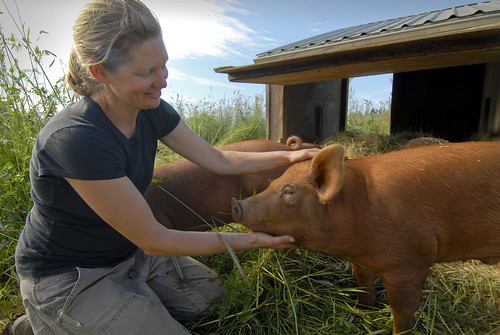
April Jones went into farming to grow good food, and she has succeeded. Unexpectedly, along the way she’s also managed to grow a community.
Jones owns and operates a 24-acre, certified-organic farm near Ridgefield, Wash. The farm includes one and one-half acres with an array of different vegetables, table grapes and herbs; four acres of pasture for her Tamworth heritage hogs; six acres of hay; and a variety of apple, fig, cherry, pear and plum trees. The rest of the farm consists of riparian and field buffers that provide habitat for hawks, kestrels and other natural pest predators.
Through a community supported agriculture (CSA) membership program, where consumers subscribe to portions of the farm’s harvests, Jones provides more than 30 local families with 25 weeks of vegetables, fruits and herbs annually. Cultivating that sense of community has resulted in a following of loyal customers who value both the quality of her produce and the relationship they now have with the local farmer who helps feed their families.
“Recently, I had a customer come to me with tears in her eyes and say, ‘I’m expecting my first child, and I can’t think of anything better to feed them than your vegetables,’” Jones says. “You have no idea how happy that makes me.”
With help from USDA’s Natural Resources Conservation Service (NRCS), Jones is taking care of her land for the future generations to come. Jones had read about NRCS’ Environmental Quality Incentives Program (EQIP) organic initiative through various listservs and agricultural publications.
Through the organic initiative, EQIP dollars can be used to implement six core conservation practices designed to improve natural resource conditions: crop rotation, cover crops, nutrient management, pest management, prescribed grazing and forage harvest management.
Qualifying as a “beginning farmer” in the program, Jones received special assistance from NRCS to seed cover crops for her hog pasture and plant vegetative hedgerows to protect her organic crops from pesticide “spray drift” from surrounding properties.
“I wasn’t going to do it any other way. I feel an inherent responsibility to do what I can to not step on Mother Nature’s toes,” Jones explains.
Anitra Gorham, an NRCS resource conservationist in the Brush Prairie office, says seeing young farmers like Jones enter the market is very satisfying. “April’s drive and commitment to her projects seem to ensure not only her success, but also the long-term sustainability of the local food movement in our area,” she says.
Organic producers, those transitioning to organic, and producers with gross organic sales under $5,000 have the opportunity right now to apply for Organic Initiative funding but they have to hurry. To receive funding during fiscal year 2011, applications must be submitted by May 20th. For more information on where and how to apply, go to the EQIP Organic Initiative Web site.
Check out more conservation stories on the USDA blog.



